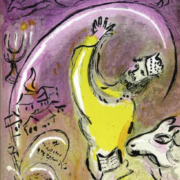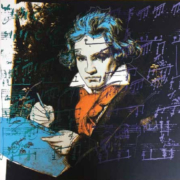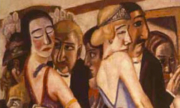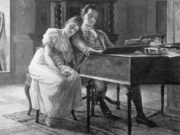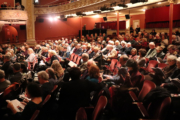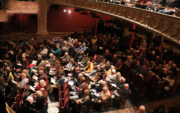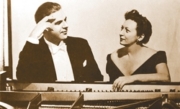Ecclesiastes, or the Hebrew name I prefer, “Kohelet,” used to delight me. I found when I mentioned this reaction to others, it often elicited a skeptical response: No, that is a book of depression, the mournful elegy of Solomon’s old age, futility and even despair. Why should the same text elicit such optimism and liberation to some, including me, and pessimism and darkness to others? Jewish communities read the text each year at Sukkot, the Autumn harvest festival. Is it the joy of the harvest or the dire onset of Winter that we bring to mind? Of course it is both. Moreover, bleak winter is a crucial moment in the cycle of fertility.
The physicality of Beethoven, the squalor of his apartment, his short temper and absentmindedness, his isolation and his being a social “misfit,” even before deafness set in – all only stand in contrast to his work. They are the shell, the leftovers of a life given over entirely to his art. He is to be found alive and vibrant in the architectural marvels-in-time of his work – in the dramatic chiaroscuro of roughness and tenderness, majesty and playfulness, the rage and the humor, at times Olympic and Promethean, at others mischievous and childlike, covering the spectrum of human experience and aspiration.
Liu Fang’s mastery of the pipa and the guzheng has established her international reputation as one of the great young interpreters of traditional Chinese music. She aspires to combine her knowledge and practice of Eastern traditions and Western classical music, contemporary music and improvisation, thereby creating new forms, uniting different cultures and discovering new audiences.
Berlin, Paris, New York—such exciting places to be during the 1920s, an era variously known as “The Jazz Age” or “The Roaring Twenties,” but certainly never The Age of Innocence, which was merely the title of a book, albeit one of Edith Wharton’s most successful tomes.
Keenly aware that Germany had no colonial presence in Asia, Heinrich Heine observed in 1821 that, while Portuguese, English and Dutch commercial ships might transport the material riches of India to the West, Germany would not fail to mine its spiritual treasures.
People have always been drawn to the idea of a child, a miniature person, performing at an adult level. The preternaturally gifted child becomes a small-scale replica of an adult, with the skill and power to gain the respect and attention of adult society. From the child prodigy’s point of view, however, the situation appears otherwise.
“What a beautiful big sound!” How often do we hear this comment during intermission or from musicians discussing a colleague they admire? This commonly voiced and seemingly flattering exclamation is problematic to me and stands as a disturbing commentary on the state of music making today.
Having entered Brown University as a committed but less than stellar physics major, midway in my studies I suddenly found myself a music major courtesy of one of those lightning bolts that transform lives.
In the latter 19th and early 20th centuries, European composers regularly inflected their music with tunes rooted in Gypsy culture, whether heartfelt laments or exuberant dance tunes. The result was a warmly embraced hybrid that bridged cultures by enrichment rather than condescension. The sources of these Gypsy melodies varied from authentic to ersatz, with many folk-like pieces “improved on” by their incorporation into more urbane works.
On June 2, 1988, twenty-six of the greatest pianists of the 20th century convened in New York’s Carnegie Hall to mount a concert unlike any other before it. The evening was organized in honor of Steinway Piano’s 135th anniversary, but the pianists who gathered around the honored instrument seemed to overshadow the very instrument that occasioned the event, the 500,000th piano built by the venerable firm.

